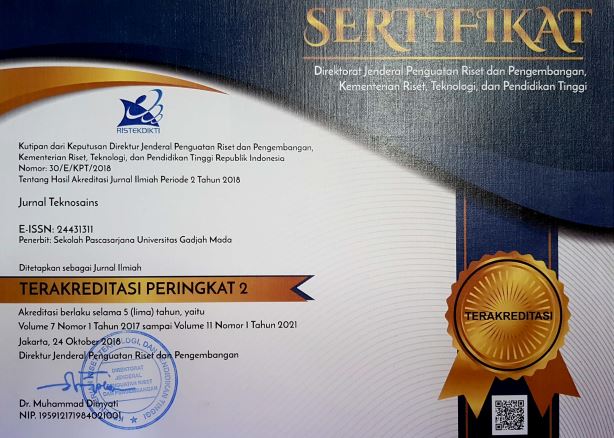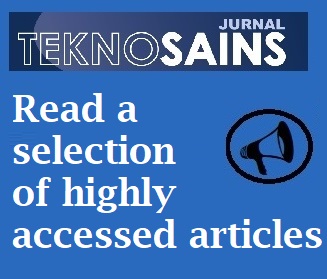Efisiensi termal dan efektivitas produksi kondensor pada solar still terpadu
Dan Mugisidi(1*), Adittia Fajar(2), Rifky Rifky(3), Oktarina Heriyani(4)
(1) Universitas Muhammadiyah Prof DR HAMKA
(2) Universitas Muhammadiyah Prof DR HAMKA
(3) Universitas Muhammadiyah Prof DR HAMKA
(4) Universitas Muhammadiyah Prof DR HAMKA
(*) Corresponding Author
Abstract
Water is a basic human need that must be fulfilled. The need for clean water is increasing while the availability of clean water is limited, so researchers are trying to use sea water as raw material for fresh water. Sea water is an abundant source of water but still contains salt, therefore it is necessary to separate sea water and its salt content to produce fresh water or desalination, one way is to use solar stil. Solar stills are mostly used for desalination processes on the coast and remote area because they can be operated easily and can be manufactured at low cost. However, solar still has low productivity, so various studies have been carried out to increase desalination yields, such as the addition of a condenser. Aim of this study was to determine the thermal efficiency and effectiveness of the condenser on solar stills. The research was conducted in period March - May 2021. The materials used are aluminum with a length of 300 mm, a width of 300 mm and a thickness of 1.6 mm for the basin plate, double glass with a thickness of 3 mm for the top and sides of the solar still. The study was conducted indoor with radiation intensity using halogen lamps. The variables measured were water temperature, evaporation, inner glass surface, condenser, inlet and outlet of the condenser cooler using a fluke meter, radiation intensity using a solar power meter and desalinated water using a digital balance. From the results of the study, the average thermal efficiency of the condenser in the integrated solar still reached 83.94% and the desalination mass of seawater reached 451.32 grams with the effectiveness of condenser production of 96.4% and the correlation value of 0.99.
Keywords
Full Text:
PDFReferences
Abdi Pranata, I. G., Dantes, K. R. Pasek Nugraha, I. N. (2019) ‘Studi Komparasi Perbandingan Air Dan Udara Sebagai Media Pendingin Kondensor Terhadap Pencapaian Suhu Optimal Siklus Primer Pada Prototipe Water Chiller’, Jurnal Pendidikan Teknik Mesin Undiksha, 7(1), p. 18. doi: 10.23887/jjtm.v7i1.18754.
Abujazar, M. S. S, S. Fatihah, A.R. Rakmi, M.Z. Shahrom.(2016) ‘The effects of design parameters on productivity performance of a solar still for seawater desalination: A review’, Desalination. Elsevier B.V., 385, pp. 178–193. doi: 10.1016/j.desal.2016.02.025.
Ahmed (1988) ‘Study of Single Effect Solar Still With an Internal Condenser’, 5(6), pp. 637–643.
Ahmed, H. M. and Ibrahim, G. (2017) ‘Thermal Performance of a Conventional Solar Still with a Built-in Passive Condenser : Experimental studies’, Journal of Advanced Science and Engineering Research, 7(3), pp. 1–12.
Al-Hamadani, A. and Shukla, S. (2013) ‘Performance of single slope solar still with solar protected condenser’, Distributed Generation and Alternative Energy Journal, 28(2), pp. 6–28. doi: 10.1080/21563306.2013.10677548.
Bara, D. A., Gusnawati and Nurhayati (2016) ‘Pengaruh Sudut Kaca Penutup dan Jenis Kaca terhadap Efisiensi Kolektor Surya pada Proses Destilasi Air Laut’, Lontar Jurnal Teknik Mesin Undana, 03(02), pp. 01–10.
Belhadj, M. M, H.Bouguettai, Yacine Marif, Moussa Zerroukia. (2015) ‘Numerical study of a double-slope solar still coupled with capillary film condenser in south Algeria’, Energy Conversion and Management. Elsevier Ltd, 94, pp. 245–252. doi: 10.1016/j.enconman.2015.01.069.
Boutriaa, A. and Rahmani, A. (2017) ‘Thermal modeling of a basin type solar still enhanced by a natural circulation loop’, Computers and Chemical Engineering. Elsevier Ltd, 101, pp. 31–43. doi: 10.1016/j.compchemeng.2017.02.033.
Çengel, Y. A., Boles, M. A. and Kanoğlu, M. (2019) Thermodynamics: An Engineering Approach, Ninth Edition.
Combes, S. (2005) ‘Protecting Freshwater Ecosystems in the Face of Global Climate Change’, (Climate), pp. 117–216.
Dwivedi, V. K. and Tiwari, G. N. (2009) ‘Comparison of internal heat transfer coefficients in passive solar stills by different thermal models: An experimental validation’, DES, 246, pp. 304–318. doi: 10.1016/j.desal.200.
El-Bahi, A. and Inan, D. (1999a) ‘A solar still with minimum inclination, coupled to an outside condenser’, Desalination, 123(1), pp. 79–83. doi: 10.1016/S0011-9164(99)00061-2.
El-Bahi, A. and Inan, D. (1999b) ‘Analysis of a parallel double glass solar still with separate condenser’, Renewable Energy, 17(4), pp. 509–521. doi: 10.1016/S0960-1481(98)00768-X.
El-Samadony, Y. A. F., Abdullah, A. S. and Omara, Z. M. (2015) ‘Experimental study of stepped solar still integrated with reflectors and external condenser’, Experimental Heat Transfer, 28(4), pp. 392–404. doi: 10.1080/08916152.2014.890964.
Elango, C., Gunasekaran, N. and Sampathkumar, K. (2015) ‘Thermal models of solar still - A comprehensive review’, Renewable and Sustainable Energy Reviews. Elsevier, 47, pp. 856–911. doi: 10.1016/j.rser.2015.03.054.
Essa, F. A., Abd Elaziz, M. and Elsheikh, A. H. (2020) ‘An enhanced productivity prediction model of active solar still using artificial neural network and Harris Hawks optimizer’, Applied Thermal Engineering. Elsevier, 170(August 2019), p. 115020. doi: 10.1016/j.applthermaleng.2020.115020.
Fath, H. E. S. and Elsherbiny, S. M. (1993) ‘Effect of adding a passive condenser on solar still performance’, Energy Conversion and Management, 34(1), pp. 63–72. doi: 10.1016/0196-8904(93)90008-X.
Guha-Sapir, D., Hoyois, P. and Below, R. (2013) ‘Annual Disaster Stastical Review 2013’, Centre for Research on the Epidemiology of Disaasters, pp. 1–50.
G.N. Tiwari, Y.P. Yadav, P.C. Eames, B. Norton,. (1994) ‘Solar distillation systems: The state-of-the-art in design development and performance analysis’, Renewable Energy, 5(1–4), pp. 509–516. doi: 10.1016/0960-1481(94)90425-1.
Guppy, L., Anderson, K., 2017. Water Crisis Report. United Nations University Institute for Water, Environment and Health, Hamilton, Canada.
Hansen, R. S., Narayanan, C. S. and Murugavel, K. K. (2015) ‘Performance analysis on inclined solar still with different new wick materials and wire mesh’, Desalination. Elsevier B.V., 358, pp. 1–8. doi: 10.1016/j.desal.2014.12.006.
Holman, J. P. (2010) Heat Transfer. Ten, McGraw-Hill. Ten. New York. doi: 10.1080/01973762.1999.9658510.
Husham M. Ahmed (2012) ‘Seasonal performance evaluation of solar stills connected to passive external condensers’, Scientific Research and Essays, 7(13), pp. 1444–1460. doi: 10.5897/sre12.177.
Incropera, F. and Dewitt, D. (2015) Fundamentals of Heat and Mass Transfer. 6th edn, John Wiley & Sons. 6th edn. Edited by M. Morgan. USA: John Willey & Sons. doi: 10.1007/978-3-319-15793-1_19.
Jesiani, E. M., Apriansyah, A. and Adriat, R. (2019) ‘Model Pendugaan Evaporasi dari Suhu Udara dan Kelembaban Udara Menggunakan Metode Regresi Linier Berganda di Kota Pontianak’, Prisma Fisika, 7(1), p. 46. doi: 10.26418/pf.v7i1.32515.
Kabeel, A. E., Omara, Z. M. and Essa, F. A. (2014) ‘Enhancement of modified solar still integrated with external condenser using nanofluids: An experimental approach’, Energy Conversion and Management. Elsevier Ltd, 78, pp. 493–498. doi: 10.1016/j.enconman.2013.11.013.
Kumar, R. A., Esakkimuthu, G. and Murugavel, K. K. (2016) ‘Performance enhancement of a single basin single slope solar still using agitation effect and external condenser’, Desalination. Elsevier B.V., 399, pp. 198–202. doi: 10.1016/j.desal.2016.09.006.
Mahian, O. Ali Kianifar, Saeed Zeinali Heris, Dongsheng Wen, Ahmet Z. Sahin, Somchai Wongwises, (2017) ‘Nanofluids effects on the evaporation rate in a solar still equipped with a heat exchanger’, Nano Energy, 36(April), pp. 134–155. doi: 10.1016/j.nanoen.2017.04.025.
Malaiyappan, P. and Elumalai, N. (2015) ‘Single basin and single slope solar still: Various basin material thermal research’, Journal of Chemical and Pharmaceutical Sciences, 7(7), pp. 48–51.
Mohan, I. Satyapal Yadav, Hitesh Panchal & Shivani Brahmbhatt. (2019) ‘A review on solar still: a simple desalination technology to obtain potable water’, International Journal of Ambient Energy. Taylor & Francis, 40(3), pp. 335–342. doi: 10.1080/01430750.2017.1393776.
Morad, M. M., El-Maghawry, H. A. M. and Wasfy, K. I. (2017) ‘A developed solar-powered desalination system for enhancing fresh water productivity’, Solar Energy. Elsevier Ltd, 146, pp. 20–29. doi: 10.1016/j.solener.2017.02.002.
Mugisidi, D. R.S Cahyani, O. Heryani, D. Agusman, Rifky. (2019) ‘Effect of Iron Sand in Single Basin Solar Still: Experimental Study’, IOP Conference Series: Earth and Environmental Science, 268(1). doi: 10.1088/1755-1315/268/1/012158.
Mugisidi, D. Berkah Fajar, Syaiful, Tony Utomo, Oktarina Heriyani, Delvis Agusman, Regita. (2020) ‘Iron Sand as a Heat Absorber to Enhance Performance of a Single-Basin Solar Still’, Journal of Advanced Research in Fluid Mechanics and Thermal Sciences, 70(1), pp. 125–135. doi: 10.37934/arfmts.70.1.125135.
Mugisidi, D. Abdul Rahman, Oktarina Heriyani, Pancatatva Hesti Gunawan. (2021) ‘DETERMINATION OF THE CONVECTIVE HEAT TRANSFER CONSTANT ( C AND N ) IN A SOLAR STILL’, Teknosains, 11(1), pp. 1–12. Available at: https://jurnal.ugm.ac.id/teknosains.
Mugisidi, D. and Heriyani, O. (2018) ‘Sea Water Characterization at Ujung Kulon Coastal Depth as Raw Water Source for Desalination and Potential Energy’, in The 2nd International Conference on Energy, Environmental and Information System (ICENIS 2017). doi: 10.1051/e3sconf/20183102005.
Nandiati, S., Kirom, M. R. and Ajiwiguna, T. A. (2019) ‘Evaluasi Kinerja pada Berbagai Variasi Susunan Heat Exchanger Menggunakan Metode LMTD dan NTU’, 6(2), pp. 5058–5065.
Navarro, H. A. and Cabezas-Gómez, L. C. (2007) ‘Effectiveness-NTU Computation with A Mathematical Model for Cross-Flow Heat Exchangers’, Brazilian Journal of Chemical Engineering, 24(4), pp. 509–521. doi: 10.1590/S0104-66322007000400005.
Ouar, M. L. A. M.H. Sellami, S.E. Meddour, R. Touahir, S. Guemari, K. Loudiyi.(2017) ‘Experimental yield analysis of groundwater solar desalination system using absorbent materials’, Groundwater for Sustainable Development. Elsevier, 5(July 2016), pp. 261–267. doi: 10.1016/j.gsd.2017.08.001.
Purwadianto, D. and Sambada, F. (2015) ‘Efek Kapilaritas Absorber pada Unjuk Kerja Destilasi Air Energi Surya Jenis Vertikal’, Ilmiah widya teknik, 14(1), pp. 54–57.
Rahmani, A., Boutriaa, A. and Hadef, A. (2015) ‘An experimental approach to improve the basin type solar still using an integrated natural circulation loop’, Energy Conversion and Management. Elsevier Ltd, 93, pp. 298–308. doi: 10.1016/j.enconman.2015.01.026.
Ranjan, K. R., Kaushik, S. C. and Panwar, N. L. (2016) ‘Energy and exergy analysis of passive solar distillation systems’, International Journal of Low-Carbon Technologies, 11(2), pp. 211–221. doi: 10.1093/ijlct/ctt069.
Rarindi, H., Priyono and Bagya, I. N. (2018) ‘Merubah Air Laut Menjadi Air Tawar Dengan Desalinasi Tenaga’, (September 2017).
Reddy, K. S. and Sharon, H. (2016) ‘Active multi-effect vertical solar still: Mathematical modeling, performance investigation and enviro-economic analyses’, Desalination. Elsevier B.V., 395, pp. 99–120. doi: 10.1016/j.desal.2016.05.027.
Refalo, P., Ghirlando, R. and Abela, S. (2016) ‘The use of a solar chimney and condensers to enhance the productivity of a solar still’, Desalination and Water Treatment, 57(48–49), pp. 23024–23037. doi: 10.1080/19443994.2015.1106096.
Rosyada, M., Prasetyo, Y. and Haniah, H. (2015) ‘Analisis Korelasi Suhu Permukaan Laut terhadap Curah Hujan dengan Metode Penginderaan Jauh Tahun 2021-2013’, Jurnal Geodesi Undip, 4(1), pp. 85–94.
Sharshir, S.W. A.H. Elsheikh, Guilong Peng, Nuo Yang, M.O.A. El-Samadony, A.E. Kabeel, (2017) ‘Thermal performance and exergy analysis of solar stills – A review’, Renewable and Sustainable Energy Reviews. Elsevier, 73(June), pp. 521–544. doi: 10.1016/j.rser.2017.01.156.
Sharshir, S W. A.H. Elsheikhd, Guilong Peng, Nuo Yang, M.O.A, El-Samadony, A.E. Kabeel.(2017) ‘Thermal Performance and Exergy Analysis of Solar Stills – A Review’, Renewable and Sustainable Energy Reviews. Elsevier Ltd, 73(December 2016), pp. 521–544. doi: 10.1016/j.rser.2017.01.156.
Siagian, S. (2015) ‘Analysis Of Condensor Performance Analysis Of A Cooling System Using Freon R-134 A Based On A Cooling Fan Running Variation’, II(124–130), p. 126.
Sivaram, P. M. et.al. (2020) ‘Experimental and numerical study of stepped solar still integrated with a passive external condenser and its application’, Environment, Development and Sustainability. Springer Netherlands, (0123456789). doi: 10.1007/s10668-020-00667-4.
Sivaram, P. M.et.al. (2021) ‘Experimental and numerical study of stepped solar still integrated with a passive external condenser and its application’, Environment, Development and Sustainability. Springer Netherlands, 23(2), pp. 2143–2171. doi: 10.1007/s10668-020-00667-4.
Srithar, K. and Rajaseenivasan, T. (2018) ‘Recent fresh water augmentation techniques in solar still and HDH desalination – A review’, Renewable and Sustainable Energy Reviews. Elsevier Ltd, 82(September 2017), pp. 629–644. doi: 10.1016/j.rser.2017.09.056.
Tabrizi, F. F., Dashtban, M. and Moghaddam, H. (2010) ‘Experimental investigation of a weir-type cascade solar still with built-in latent heat thermal energy storage system’, Desalination, 260(1), pp. 248–253. doi: 10.1016/j.desal.2010.03.033.
Tiwari, A. K. and Tiwari, G. N. (2006) ‘Effect of water depths on heat and mass transfer in a passive solar still: in summer climatic condition’, Desalination, 195(1–3), pp. 78–94. doi: 10.1016/j.desal.2005.11.014.
Tiwari, G. N., Dimri, V. and Chel, A. (2009) ‘Parametric study of an active and passive solar distillation system: Energy and exergy analysis’, Desalination, 242(242), pp. 1–18. doi: 10.1016/j.desal.200.
Tiwari, G. N., Kupfermann, A. Aggarwal, S. (1997) ‘A new design for a double-condensing chamber solar still’, Desalination, 114(2), pp. 153–164. doi: 10.1016/S0011-9164(98)00007-1.
Tiwari, G. N., Shukla, S. K. and Singh, I. P. (2003) ‘Computer modeling of passive/active solar stills by using inner glass temperature’, Desalination, 154(2), pp. 171–185. doi: 10.1016/S0011-9164(03)80018-8.
Youssef, P. G., Al-Dadah, R. K. Mahmoud, S. M. (2014) ‘Comparative analysis of desalination technologies’, Energy Procedia. Elsevier B.V., 61, pp. 2604–2607. doi: 10.1016/j.egypro.2014.12.258.
Zeroual, M. dkk. (2011) ‘Experimental investigation on a double-slope solar still with partially cooled condenser in the region of Ouargla (Algeria)’, Energy Procedia, 6, pp. 736–742. doi: 10.1016/j.egypro.2011.05.083.
Zurigat, Y. H. Abu-Arabi, M. K. (2004) ‘Modelling and performance analysis of a regenerative solar desalination unit’, Applied Thermal Engineering, 24(7), pp. 1061–1072. doi: 10.1016/j.applthermaleng.2003.11.010.
Article Metrics
Refbacks
- There are currently no refbacks.
Copyright (c) 2022 Dan Mugisidi dkk.

This work is licensed under a Creative Commons Attribution-ShareAlike 4.0 International License.
Copyright © 2024 Jurnal Teknosains Submit an Article Tracking Your Submission
Editorial Policies Publishing System Copyright Notice Site Map Journal History Visitor Statistics Abstracting & Indexing










